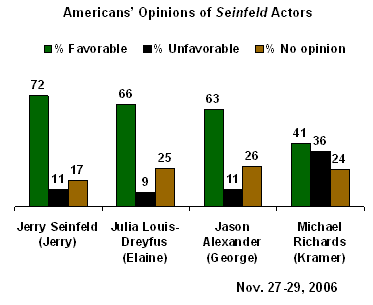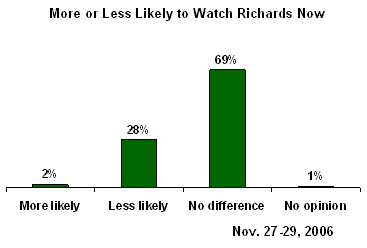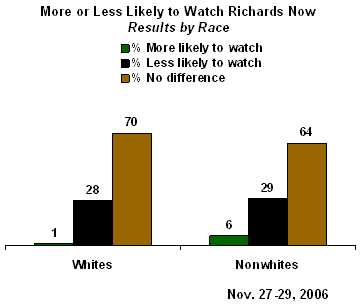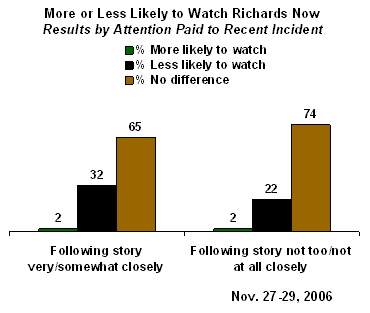GALLUP NEWS SERVICE
PRINCETON, NJ -- During a stand-up comedy performance at the Laugh Factory in Hollywood, Calif. on Nov. 17, 2006, former Seinfeld star Michael Richards used racial epithets and directed other racist remarks at audience members he claims were interrupting his performance. A video of the incident ricocheted around the Internet, the media made it a high-visibility story, and Richards himself appeared on The Late Show with David Letterman and other venues offering his apologies.
A new Gallup Panel poll finds mixed evidence on the impact of the highly publicized incident on Richards' image. Americans now rate Richards more negatively than his fellow Seinfeld co-stars, but still, his overall ratings are more positive than negative. When asked about the impact of the incident on their probability of watching Richards in future television or movie projects, nearly 7 in 10 Americans say that the incident will make no difference to them. Of the remainder, most say the incident made them less likely rather than more likely to watch Richards.
Nonwhites are more negative than positive in their assessment of Richards, while whites are more positive than negative. Both whites and nonwhites, however, show little difference in their likelihood to watch Richards in the future. More than half of Americans have followed the incident very or somewhat closely, and those in this more attentive group are more negative in their ratings of Richards -- and are more inclined to say they will not watch Richards in the future than those not following the story.
Americans Rate Actors in TV Sitcom Seinfeld
The Nov. 27-29, 2006 poll was conducted 10 days after Richards made the remarks, and followed his appearance on The Late Show with David Letterman where he publicly apologized for what he said.
Americans were asked to say whether they have a very favorable, somewhat favorable, somewhat unfavorable, or very unfavorable opinion of the four actors that starred in the NBC hit sitcom Seinfeld. (This question was asked before respondents were reminded specifically about the comedy club incident.)
More than 6 in 10 Americans have a very or somewhat favorable view of three of the actors in the show. Jerry Seinfeld, who played the title character, has a 72% favorable rating; Julia Louis-Dreyfus, who played Elaine, has a 66% favorable rating; and Jason Alexander, the actor who played George, has a 63% favorable rating. In contrast, Americans rate Michael Richards, who played Kramer, significantly more negatively than his co-stars, but on balance more positively (41%) than negatively (36%). One in five Americans were not familiar enough with the show to rate these actors.

Whites and nonwhites do not differ in their opinions of Seinfeld, Louis-Dreyfus, or Alexander with a solid majority of both groups favorably rating these three actors. Whites are more positive than negative in their view of Richards, with a 41% favorable and 36% unfavorable rating. The exact opposite is true for nonwhites -- 30% rate Richards favorably, while 45% rate him unfavorably.
|
Opinion of Seinfeld Actors by
Race |
||
|
Whites |
Nonwhites |
|
|
% |
% |
|
|
Jerry Seinfeld |
|
|
|
Favorable |
72 |
69 |
|
Unfavorable |
11 |
11 |
|
No opinion |
17 |
20 |
|
|
|
|
|
Julia Louis-Dreyfus |
|
|
|
Favorable |
65 |
65 |
|
Unfavorable |
9 |
8 |
|
No opinion |
25 |
27 |
|
|
|
|
|
Jason Alexander |
|
|
|
Favorable |
63 |
62 |
|
Unfavorable |
11 |
10 |
|
No opinion |
26 |
28 |
|
|
|
|
|
Michael Richards |
|
|
|
Favorable |
41 |
30 |
|
Unfavorable |
36 |
45 |
|
No opinion |
24 |
25 |
How Closely Followed?
Fifty-six percent of Americans say they are following the news of the Richards' incident at least somewhat closely, including 16% who have been following it very closely. Forty-three percent of Americans say they are not following it closely or at all.
Among those following the story closely, views of Richards are slightly more negative than positive, with 41% rating him favorably and 47% unfavorably. Among those not following the story closely, ratings of Richards are somewhat more positive than negative (by a 39% to 22% margin), although 39% are not familiar enough with Richards to rate him.
Those following the story closely appear in general to be much more familiar with all of the Seinfeld stars, and rate Seinfeld, Louis-Dreyfus, and Alexander significantly more positively than those who have not been following the story closely. Still, Richards gets higher negatives and lower positives than his three co-stars in both groups.
|
Opinion of Seinfeld Actors by
Attention Paid to Richards' Racist Remarks |
||
|
Following incident |
Following incident |
|
|
% |
% |
|
|
Jerry Seinfeld |
|
|
|
Favorable |
82 |
57 |
|
Unfavorable |
9 |
13 |
|
No opinion |
9 |
29 |
|
|
|
|
|
Julia Louis-Dreyfus |
|
|
|
Favorable |
78 |
49 |
|
Unfavorable |
7 |
12 |
|
No opinion |
15 |
39 |
|
|
|
|
|
Jason Alexander |
|
|
|
Favorable |
75 |
49 |
|
Unfavorable |
10 |
11 |
|
No opinion |
15 |
40 |
|
|
|
|
|
Michael Richards |
|
|
|
Favorable |
41 |
39 |
|
Unfavorable |
47 |
22 |
|
No opinion |
12 |
39 |
Americans' Specific Reactions to Richards Incident
To test the possible impact of the incident on Michael Richards' career, the poll asked Americans directly if Richards' remarks will make them more likely or less likely to watch a TV show or movie in which he appears in the future, or if it would make no difference to them. Overall, 69% of Americans say the incident will make no difference to them, while 28% say it will make them less likely to watch Richards. (Two percent say it will make them more likely to watch Richards.)

Whites and nonwhites show only modest variations in response to this question.

Americans following this incident closely are more inclined than those who are not following it closely to say they are less likely to watch Richards in the future, 32% to 22%, respectively. Still, a majority of both groups say the incident will not make a difference.

Survey Methods
Results for this panel study are based on telephone interviews with 1,003 national adults, aged 18 and older, conducted Nov. 27-29, 2006. Respondents were randomly drawn from Gallup's nationally representative household panel, which was originally recruited through random selection methods. For results based on the total sample of national adults, one can say with 95% confidence that the maximum margin of sampling error is ±3 percentage points. In addition to sampling error, question wording and practical difficulties in conducting surveys can introduce error or bias into the findings of public opinion polls.
19. Thinking now about some of the actors from the television comedy Seinfeld, now showing in reruns, please say whether you have a very favorable, somewhat favorable, somewhat unfavorable, or very unfavorable opinion of these people. If you are not familiar with any of the people, just say so. How about -- [RANDOM ORDER]:
|
2006 Nov 27-29 |
Very |
Total |
Total |
|
% |
% |
% |
|
|
Jerry Seinfeld, who played Jerry |
36 |
72 |
11 |
|
Julia Louis-Dreyfus, who played Elaine |
31 |
66 |
9 |
|
Jason Alexander, who played George |
29 |
63 |
11 |
|
Michael Richards, who played Kramer |
16 |
41 |
36 |
Full Results:
Jason Alexander, who played George
|
Very |
Somewhat |
Somewhat |
Very |
No |
|
|
2006 Nov 27-29 |
29% |
34 |
7 |
4 |
26 |
Julia Louis-Dreyfus, who played Elaine
|
Very |
Somewhat |
Somewhat |
Very |
No |
|
|
2006 Nov 27-29 |
31% |
35 |
6 |
3 |
25 |
Michael Richards, who played Kramer
|
Very |
Somewhat |
Somewhat |
Very |
No |
|
|
2006 Nov 27-29 |
16% |
25 |
18 |
18 |
24 |
Jerry Seinfeld, who played Jerry
|
Very |
Somewhat |
Somewhat |
Very |
No |
|
|
2006 Nov 27-29 |
36% |
36 |
6 |
5 |
17 |
20. How closely have you been following the news about racist remarks made during a stand-up comedy routine by Michael Richards, who played Kramer on Seinfeld -- very closely, somewhat closely, not too closely, or not at all?
|
Very |
Somewhat |
Not too |
Not |
No |
|
|
2006 Nov 27-29 |
16% |
40 |
26 |
17 |
* |
|
* = Less than 0.5% |
|||||
21. As a result of this incident, are you more likely to watch a TV show or movie in which Michael Richards appears, less likely, or does it not make any difference to you?
|
|
More |
Less |
No |
No |
|
2006 Nov 27-29 |
2% |
28 |
69 |
1 |